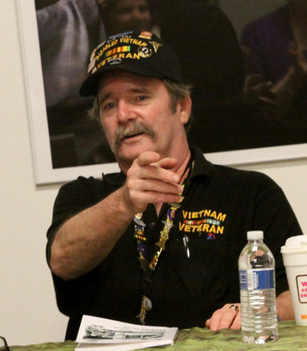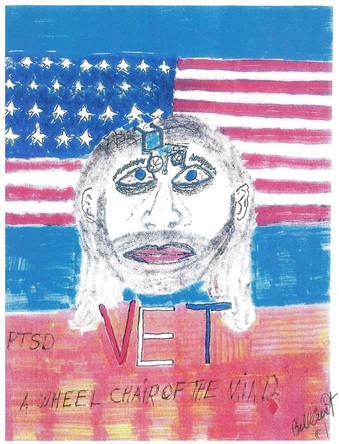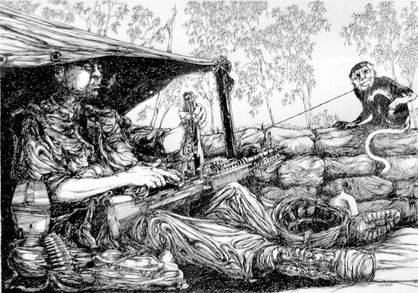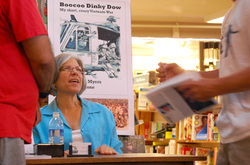 Bill Crist shares his stories Bill Crist shares his stories The military loves rank and insignia. Why not designate worthy veterans as Top Brass Volunteers? I'd nominate Bill Crist. Bill is a fixture at the National Veterans Art Museum, where Grady's work is part of the permanent collection. When I gave a reading from "Boocoo Dinky Dow" at the Chicago museum last spring, Bill was my guest veteran reader. (Because Grady died in 2011, I like to have a fellow join me to bring a male voice to the telling of his story.) Bill did more than read passages from the memoir. He talked about his own experiences with the Army's 25th Infantry in Vietnam. He told his stories with flair, conviction and a charming lack of political correctness. Afterwards, he gave the audience a tour of "The Things They Carried," an exhibit of military gear that he organized and helped finance. It struck me that Bill's greatest contribution is his willingness to talk about his own difficult journey since Vietnam. He told me some of his story after the museum reading. We met up at a neighborhood bar. He insisted on buying me a cocktail, but ordered a soft drink for himself. "I was an alcoholic for 15 years," Bill told me. "I was just trying to kill the bad memories in my head. Now I've been sober for 15 years." Post-traumatic stress was affecting him as soon as he came back, in 1971, from a world of sniper fire and body count competitions. Before being drafted, he'd started college. "I couldn't go back to school after 'Nam. I wanted to be a history teacher, but gave that up."  "PTSD Wheelchair of the Mind" by Bill Crist "PTSD Wheelchair of the Mind" by Bill Crist He found work in a warehouse, as a truck driver, as a salesman. Over the years, his stress piled up like so many sandbags on his soul. "I've been to Vietnam in my mind more than 300 times," he said. Eventually, he ended up at Hines VA Hospital, where he spent 50 days in the psychiatric ward. Art therapy was part of his treatment. One day, "a therapist asked us to draw something in our minds that was bothering us." Bill responded with "colors that kind of like to jump off the page and go after you." His illustrations of soldiers and veterans show troubled faces, bloody limbs, American flags. They ended up in the museum collection (see them here), even though "I never intended for anyone to see those drawings." Bill has lectured at Loyola University about his post-war trauma. When he takes student groups through the museum, he shares what happened during the war. The kids love trying on the rucksack that he donated to the exhibit. They like his candid recollections, such as the fact he didn't stand up when he had to pee in Vietnam because that was a sure way for a soldier to become a target. It's a tough sell to get veterans to volunteer and share their stories with the public, Bill said. He'd be glad to mentor anyone who'd like to soldier up and give it a try.
2 Comments
 'The Mascot' by Grady Myers As I prepare for this Saturday's reading at the National Veterans Art Museum, I have been having a flashback to the 1980s. I am in the rotunda of the nation's Capitol where I'm viewing, with a combination of sadness and fascination, a traveling exhibit organized by the Vietnam Veterans Art Group. Sadness because so many of the works depict violence and loss. Fascination because the exhibit, "Reflexes and Reflections," has many excellent and compelling images -- including three drawings and a collage created by Grady Myers. Grady and I were married then. I don't recall how he connected with the Chicago-based art group; we lived in Boise and Spokane during the '80s. He was excited to create work for the show. It was the first time he had tackled Vietnam War art since illustrating "Boocoo Dinky Dow," the memoir that we wrote together in the late 1970s. While the book manuscript was packed away and not published until after Grady died in 2011, the Vietnam Veterans Art Group kept evolving. The traveling art exhibit found a permanent home in Chicago's Loop and became the Vietnam Veterans Art Museum in 1996. Its mission expanded to included artists from other wars and in 2010 it was renamed the National Veterans Art Museum. Last fall, the museum moved to a new Chicago location. You can read more about it here. Take time to nose around nvam.org. The museum's entire collection of art is available online. Of course, there's nothing like seeing art in person. Tours are free. Grady's drawing titled "The Mascot," shown here, is a favorite with young museum visitors. At the April 20 reading of "Boocoo Dinky Dow," the museum collection will expand with the contribution of his original art from the book.  I'm heading out to book signings today in Pullman, Spokane and Moscow (Idaho!). I know I'll hear some good stories as people stop to tell me what they did during the Vietnam era. "We were in the dorm when we got our draft numbers ... went running down the halls because we were so happy ... but other guys weren't." Or: "I when I was in the 'Nam, the guys in my squad called me Chief, because I'm Indian. Nobody else got to do that. But with them, it was OK." Or, often: "Sign one for my uncle. He served, but he never talks about it." Sometimes I visit with people who've already read "Boocoo Dinky Dow." Two couples told me they read it to each other in bed. Wow ... for a writer, it doesn't get any better than hearing that the stories you sent out to the world are part of people's most intimate lives for awhile. |
Julie Titone is co-author of the Grady Myers memoir "Boocoo Dinky Dow: My short, crazy Vietnam War." Grady was an M-60 machine gunner in The U.S. Army's Company C’s 2nd Platoon, 1st Battalion, 8th Regiment, 4th Infantry Division in late 1968 and early 1969. His Charlie Company comrades knew him as Hoss. Thoughts, comments? Send Julie an email. Archives
November 2018
|
 RSS Feed
RSS Feed